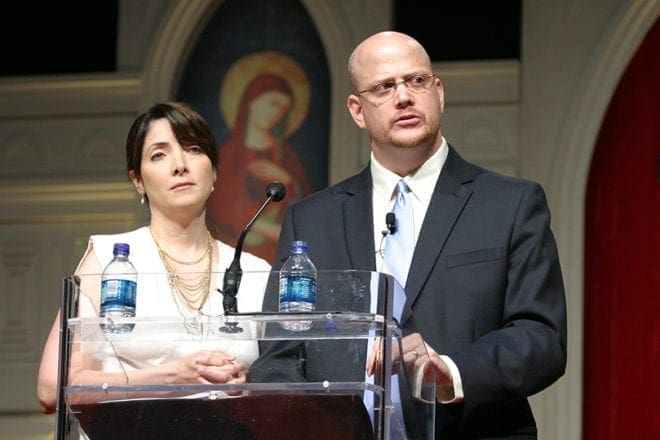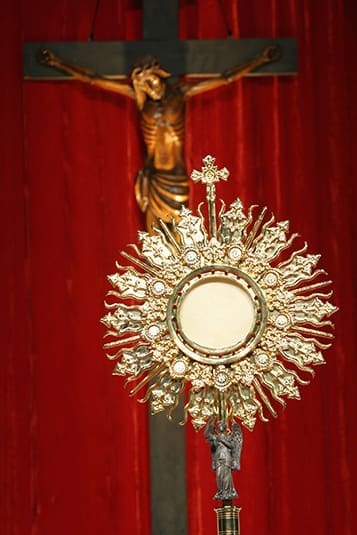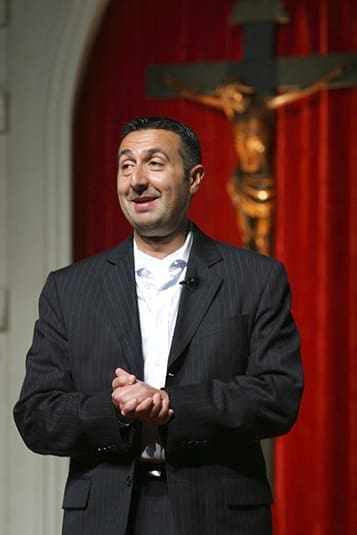 Photo By Michael Alexander
Photo By Michael AlexanderCollege Park
Faith Stories Linger After General Track Ends
By GRETCHEN KEISER, Staff Writer | Published June 18, 2009
Greg and Jennifer Willits, founders of the Rosary Army and hosts of “The Catholics Next Door with Greg & Jennifer Willits” on Sirius XM Satellite Radio, led the General Track’s first session, sharing their personal journey and suggesting that others discern if God is calling them to be involved in spreading the Gospel in a special way.
“We all have a vocation in life,” Greg Willits said, noting that for some it may be to the single life, for some it may be to marriage, for some it may be a religious vocation. However, beyond that primary vocation, they said one could be also called to serve in an apostolate.
“In addition to our vocation as a married couple, we also learned that God wanted much more from us,” Jennifer Willits said.

Jennifer and Greg Willits can usually be heard on their Sirius XM Satellite Radio show, The Catholics Next Door, but they kicked off the General Track with a live presentation. Photo By Michael Alexander
The Conyers couple began the Rosary Army, a nonprofit Catholic organization that originally started as an apostolate dedicated to making, praying and giving away all-twine knotted rosaries and encouraging others to do the same. The Rosary Army has grown to include a production group that co-produces the popular “That Catholic Show” video series, featuring Greg and Jennifer, and a podcast studio responsible for the Rosary Army Catholic podcast and podcasts dedicated to growing in the Catholic faith, praying the rosary and the consecration of one’s life to Jesus through Mary. Their apostolate takes place as they raise their young family.
While people are at various stages on their faith journey, Greg Willits encouraged people to do more for their faith life.
The Willits said all apostolates have the same goal, which is to spread the news of salvation to as many people as possible. The couple asked those present to pray about what their apostolate might be, and in what ways they can reach people, whether family members, friends or strangers in other cities, states and countries.
“God might be calling you or your entire family today to start such an adventure,” Jennifer Willits said encouragingly.
‘How Could I Not Have Known That?’
Lino Rulli, host of “The Catholic Guy” on Sirius XM Satellite Radio, brought a self-effacing levity to his General Track address. A cradle Catholic and graduate of Catholic schools from grade school through college, he marveled at how it was that he lived most of his life unfamiliar with the central Catholic belief in Jesus’ real presence in the Eucharist. The laughter from the audience indicated his message resonated with many.
At a business lunch meeting 11 years ago he was asked if he believed in the real presence of Jesus in the Blessed Sacrament. He admitted his embarrassment at the time for not knowing what “real presence” meant, saying he went quickly to the Internet and found an online quiz for kids that introduced this church teaching.
He then proceeded to question a priest friend about the real presence.
“Really?” Rulli responded when he heard that the Eucharist was the body and blood, soul and divinity of Jesus. “How could I not have known that?” he asked his friend, who responded, “It’s only been the teaching of the church for 2,000 years.”
“Growing up I took some things as recommendations,” he said. “I didn’t think much about that stuff.”
He called himself a “bad Catholic.” “Except I didn’t know I was a bad Catholic.”
He addressed the audience, “For you pious people out there, be patient with us bad Catholics. We just don’t know a lot of stuff.”
Rulli turned to the sacrament of confession next. Whether it was in college confessing his sins sitting on a beanbag chair or at St. Peter’s Basilica in Rome being asked to come up with a number of his mortal sins over a seven-year period, Rulli explained how a few experiences with the sacrament had negatively colored his reception of it. Again, though, he sought out his priest friend, who offered a perspective on why gauging mortal sins is important.
“He asked me, ‘If you were dating a girl and she told you she had cheated on you, would it make a difference if it was one time or 50?’ The point is that with sin you have to understand yourself. … The idea of confession is to be honest with yourself and with God. Was it one time or one thousand? And really, it’s all about the Eucharist—Jesus’ body and blood, soul and divinity—so I can be close to God. It’s the Eucharist that makes me do this, go to confession,” Rulli said.
Whatever his reluctance with confession has been from time to time, he said he is able to persevere because “I love the Mass more.”
“Isn’t it amazing how God works with us flawed human beings?” he asked.
He understands the need to keep his ego in check for the love of the Eucharist.
“’Behold, I am with you always,’” he recalled the promise of Jesus. “That’s what the real presence is all about. Why go to confession? You’ll do it because the Eucharist made you do it.”
‘He Preached The Holy Hour’
Father Andrew Apostoli, a Franciscan Friar of the Renewal, was ordained by Archbishop Fulton Sheen and said his priesthood has been influenced and guided by the archbishop’s mentoring ever since. He is now one of those working on the cause of canonization for Archbishop Sheen, who has been given the title of Servant of God, a step in the process.
One of many insights Father Apostoli gave into the life and ministry of Archbishop Sheen was that the archbishop made a daily holy hour before the Blessed Sacrament and never missed this commitment despite arduous schedules and international travel.
“He said I have no natural talent. I am not a good speaker. It all comes from the Blessed Sacrament,” Father Apostoli said.

The Blessed Sacrament is exposed on the altar in the monstrance against the backdrop of the corpus of Christ hanging on the crucifix. Through his death, Jesus, the sacrificial Lamb, saved all of humanity. Photo By Michael Alexander
“He preached the holy hour. He made it faithfully for 62 years,” the priest added.
While much has been made of Archbishop Sheen’s telegenic presence and oratorical skills, he believed his effectiveness in reaching a television audience of 30 million people, many of them non-Catholics, with his show “Life Is Worth Living,” was the power of the Eucharist, Father Apostoli said.
“He received 28,000 letters after his first show,” the priest said, despite the fact that he was placed opposite Milton Berle, the most popular television entertainer at the time.
Eucharistic adoration has three purposes, Father Apostoli said, “friendship with Jesus,” transformation into the likeness of Jesus, and reparation for offenses against God and intercession for the needs of others.
Spending time in the presence of Jesus in the Blessed Sacrament, “you start to have the voice of Jesus in your life. Your heart is filled with Jesus’ love. … Jesus becomes more personal.”
While it may seem that not much can come from minutes spent in adoration, the friar said, in fact, it is like the multiplication of the loaves and fishes. “Jesus will take your love and will multiply it and many souls will be saved.”
‘Choose Good Sources’
Teresa Tomeo, host of the “Catholic Connection” on EWTN Global Catholic Radio and Sirius XM Satellite Radio, stressed the importance of guarding against the negative messages that swamp everyone’s lives through media, and particularly threaten young people as they try to establish their values and make life decisions.
Young people need to be given information about the effect of the media at a younger and younger age, she said. She spoke of her own struggle with an eating disorder as a young teen because she wanted to look like a television actress. She said although she recovered, it has had lifelong health consequences, possibly preventing her from having children.
Asked what young people need the most, she answered emphatically, “Truth.”
“When you are making decisions about morality and about the church, do not form those opinions based solely on the secular news media,” Tomeo said. “Choose good sources.”
She spoke of the availability of church documents on the Internet to deepen knowledge of the faith, to answer others’ questions accurately, and to defend the faith.
Tomeo offered a practical suggestion: Put a statue or picture of Mary or Jesus near the TV, so that it reminds you to consider whether what you are casually watching is worthy of your deeper values.
“Spend one night a week with your family with no media,” she advised. “Join media awareness groups. Write letters to the editor. Provide the media with feedback. Be knowledgeable about your faith.”
‘I Felt Baptized Again’
“In the currents of those waters, wet and frozen … having just faced death, I felt baptized again.’
With those riveting words, Frederick Berretta summed up his extraordinary experience as a passenger on Flight 1549 as it safely crash-landed in New York’s icy Hudson River last January.
The final speaker at the General Track, Berretta held his audience spellbound as he recalled each detail of a business traveler’s ordinary day until it became possibly his last minutes on earth.
“I believe there is an important lesson in the events of Flight 1549,” he said. “When humanity does its best, if we place our trust in God’s mercy and providence in the darkest hour, miracles can happen.”

Lino Rulli shares a humorous moment with the spectators in the General Track about his faith journey. Photo By Michael Alexander
The husband, father and businessman from Charlotte, N.C., said he had recently made his Catholic faith a high priority again in his life after a time when the pressures of his work had pushed it somewhat to the side. He had a long devotion to Mary, particularly in her apparitions at Fatima, to the rosary, and more recently to the Divine Mercy devotion and the divine insights given to St. Faustina.
On the day before the plane crash, he found in his briefcase a forgotten booklet about the Divine Mercy. He prayed the chaplet, read in the booklet the promises told to St. Faustina, including the promise that in the hour of mercy, three o’clock, nothing would be refused to one who asked for God’s mercy.
On Jan. 15, he stopped at St. Patrick’s Cathedral in New York for Mass and Communion and bought a book on the Eucharist at the gift shop.
During the minutes about the plane, when everything seemed to slow to an excruciating awareness of the fragility of life and the imminence of death, he remembered the promise of the hour of mercy and asked God to have mercy on them. He also made a decision to surrender completely to God’s will, whatever it might be.
Looking back, he remembers it all—hitting the water “like concrete,” hitting his head, the plane rocking violently, gravity pulling them hard to the right, sliding, floating, water all around them, then realizing the fuselage was intact and they were alive. Thirty minutes later they were all safe.
“God is in control, without question in complete and utter control,” Berretta said.
“The mercy of God is beyond our capacity to grasp,” he added.
“Death is not something we should fear if we are in God’s grace. It is good to be ready. We don’t know the hour when it will come,” Berretta said.
“When you are going down in a plane, you don’t think about the differences among the people around you,” he added. “I was fortunate to witness the grace and dignity human beings are capable of. … I must say to God—not mine, but your life to live.”
Stephen O’Kane and Suzanne Haugh contributed to this article.
CDs and DVDs of speakers from various tracks at the 2009 Eucharistic Congress may be ordered at http://myecns.com/aec09.html.